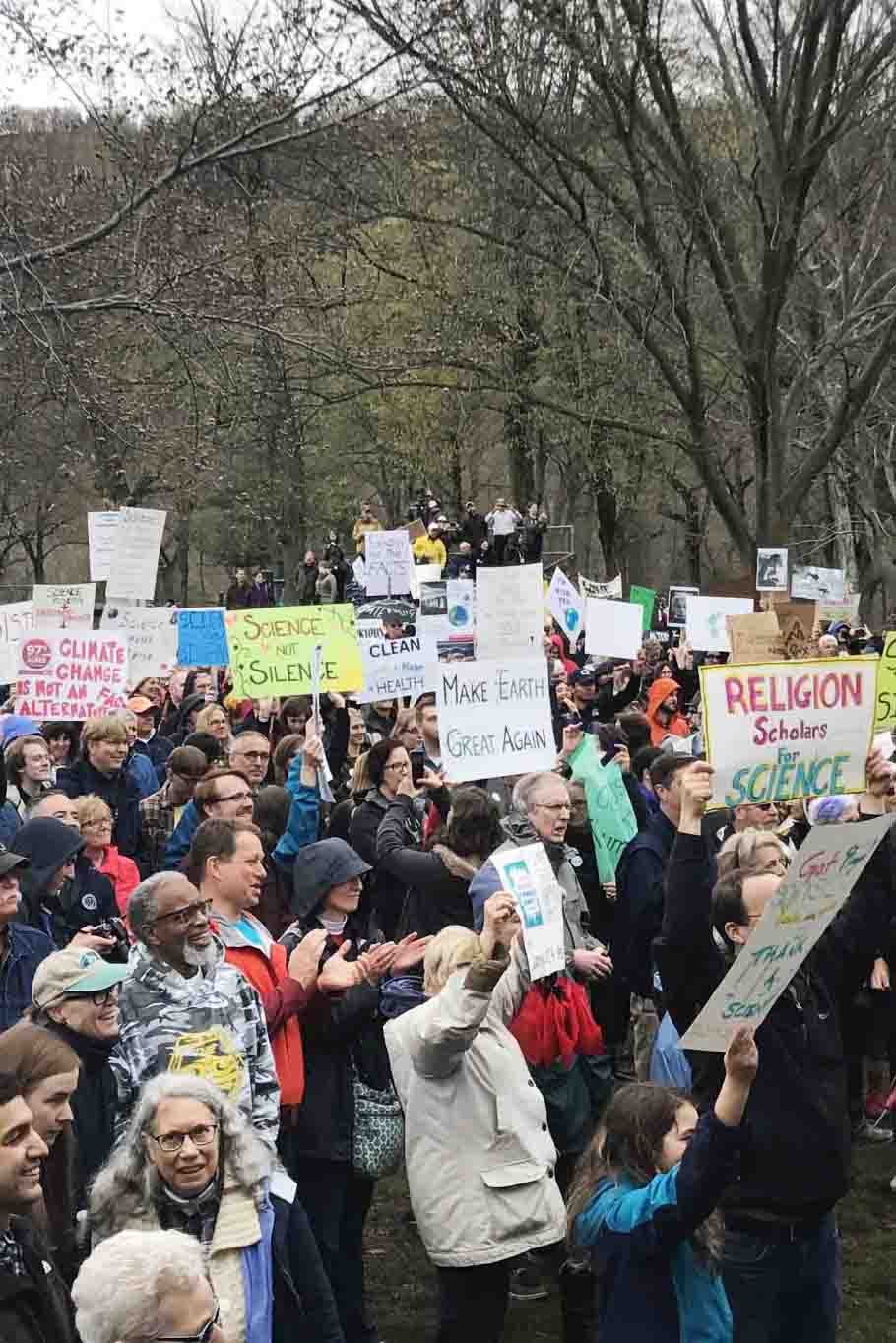
More than 3,000 people gathered at East Rock Park on Saturday to participate in the New Haven March for Science, an event celebrating science and protesting the Trump administration’s climate change denial and proposed cuts to science funding.
The march — one of more than 600 similar marches around the world — was well-attended by Yale faculty members and students, as well as people from throughout Connecticut. The event was composed of three parts: an initial gathering, a series of speeches and the demonstration itself. Speakers at the rally included various politicians, scientists and science educators from Connecticut.
“Let’s start with some scientific facts: The world is not flat, the sun does not revolve around the Earth and the world does not revolve around Donald Trump,” Sen. Richard Blumenthal LAW ’73, D-Conn., said at the rally.
The New Haven chapter of Action Together Connecticut, a Connecticut progressive activist group that organized and sponsored the march, first became involved in the march when members reached out to the organizers of a Facebook event entitled March for Science New Haven, said Valerie Horsley, a professor of molecular, cellular and developmental biology at Yale and a member of Action Together CT. Unable to find out whether the event was actually happening, Horsley, along with fellow Yale faculty and members of Action Together CT, decided to “take over” the march, she said.
The event kicked off at 1 p.m. with the opening of several informational booths. Some booths focused on activism, helping participants make signs and contact their representatives. Others housed simple scientific demonstrations, such as the extraction of DNA from a tomato and the effects of music on the brain.
Helen Sun GRD ’21, who co-ran a presentation demonstrating the use of cellphone-attachable microscopes, was one of many Yale students organizing booths.
“I feel like after an election, the people here get really divided. There’s a group that’s pro-science and a group that’s anti-science,” Sun said. “I just want to show people the more human side of science.”
The event organizers also distributed postcards that they encouraged attendees to send to elected representatives expressing disapproval of rollbacks on research funding and climate change action.
“The fact that the current administration doesn’t believe in science at all is a problem, especially when it comes to climate issues,” Horsley said. “For me personally, I fund my lab through the federal government, and we’re already in a funding crisis. Any further reduction in the [National Institutes of Health] budget is going to kill science in the U.S.”
Speeches at the event lasted an hour, with speakers rallying the crowd and encouraging ongoing activism on behalf of science and the environment. State Rep. Lonnie Reed, D-Branford, one of the speakers, emphasized the importance of connecting politicians to the scientific community and encouraged scientists to collaborate with their local legislatures.
After the rally, participants marched for about 1.5 miles through the East Rock neighborhood, according to Hilary Grant, a member of Action Together CT.
The chant, “Say it loud, say it clear; science facts are welcome here,” was repeated throughout the march. Half of the street was closed off, with traffic on the opposite side of the street forced to a standstill at times. Drivers honked in solidarity as they passed the procession.
“We’re one of many marches. We want to show that New Haven is part of that movement and that this community is a force,” Grant said. She added that this march is of particular interest to Action Together CT because many of the group’s members are involved in the science community at Yale.
Many of the signs at the march referenced Trump, using slogans such as “Science trumps silence” and “Climate change is nastier than women.”
Some participants said they were inspired to continue organizing against the Trump administration after participating in the Women’s March earlier this year, while others expressed uncertainty as to what effect organizing could even have.
“I don’t know if this will do any good,” said Diane Szymaszek, a march participant. “But I do know that I can’t just stay home and do nothing. If all I can do is come here and be a body in this march, to support scientists and support the Earth, then I’m going to do that.”
In a Friday email to the Yale community, University President Peter Salovey said that Yale will continue to fight for “federal funding that advances our national and human interests,” specifically addressing Trump’s proposed cuts to student aid, the National Institutes of Health and the National Endowment for the Humanities that will take effect in 2018.







